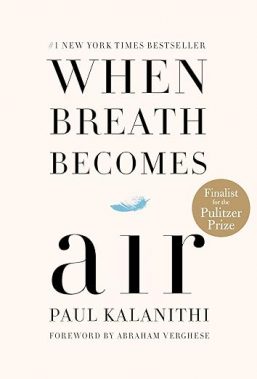First Published : Jan 2016
Genre : Non Fiction, Memoir
My Rating : ⭐️⭐️⭐️
Introduction
I think one of the things that pulled me to this book was the title. There is a sense of self awareness, a poignancy, about the title that makes you stand up and pay attention. This is a touching memoir of the late Dr. Paul Kalanithi – who at the peak of his neuroscience career, transitions from being a doctor to a cancer patient.
The Writer
The book starts off with Paul’s background and within a few pages we come to know his childhood and I was already connected to his story. He was initially planning on becoming a writer and I can already sense the story teller in him just going through the way he recounts his childhood.
It’s funny how his interest in neuroscience came about in such a random manner when he was given a book by his then girlfriend – Satan: His Psychotherapy and Cure by the Unfortunate Dr. Kassler, J.S.P.S., by Jeremy Leven. ( I am immediately drawn by this book title as well and honestly one of the best synopsis I have read in a long time. ‘Satan returns to earth in the form of a computer and chooses psychoanalyst Sy Kassler to cure him of an unhappiness caused by his eternal competition with God.’)
The Doctor
This isn’t the first book that shows the true reality of the state of doctors and how overworked and underpaid they are.
The way Paul describes the anatomy lab, raw, and what they do to cadavers (a term I learnt from this book) – I feel bad for the dead. It’s inevitable and even necessary but still I feel bad.
The mannequins (for CPR) you pretend are real; the cadavers you pretend are fake.
In our rare reflective moments, we were all silently apologizing to our cadavers, not because we sensed the transgression but because we did not.
The first half of the book is very engaging with Paul sharing his experiences of his patients. The small Ob-Gyn episode reminds me of the book This Is Going To Hurt by Adam Kay (Another good book to read and it’s light hearted).
The Patient
Paul’s life was like any other, he was overworked but thriving in his career, going through marital issues with his wife Lucy and then this diagnosis. He acknowledges quite candidly that it might have saved his marriage, as Lucy refused to leave his side during his lowest point. When Paul realised he had cancer, as a doctor, he already knew what was going to happen and how his life is going to change drastically.
He almost gives up his work but then does his best to come back as a doctor, doing what he calls – “his calling”. He does that with the support of his family, his friends and colleagues.
Neuroscience is a calling. You can’t see it as a job, because if it’s a job, it’s one of the worst jobs there is.
There are parts where he tries to figure out a future where the timeline is unknown, his concerns on starting a family, his decision on what next to do with his career, that fight with uncertainty. Interestingly it is similar for us as well, we don’t know whats coming next or when it could be our last but we take for granted the luxury we have – we live everyday planning for tomorrow. I think Paul sums it up pretty well –
Before my cancer was diagnosed, I knew that someday I would die, but I didn’t know when. After the diagnosis, I knew someday I would die, but I didn’t know when. But now I knew it acutely.
My Final Thoughts
By the end I was ugly crying, not expecting the book to end where it did. I knew that’s exactly how this book will leave me.
I loved this sentence in the Epilogue by Lucy – Paul, if alive, would have helped many people, but even in death he has tried to do the same. Not many can claim that.
It is going to be tough reading, and you will cry but it might be worth it. Go for it!

Leave a Reply